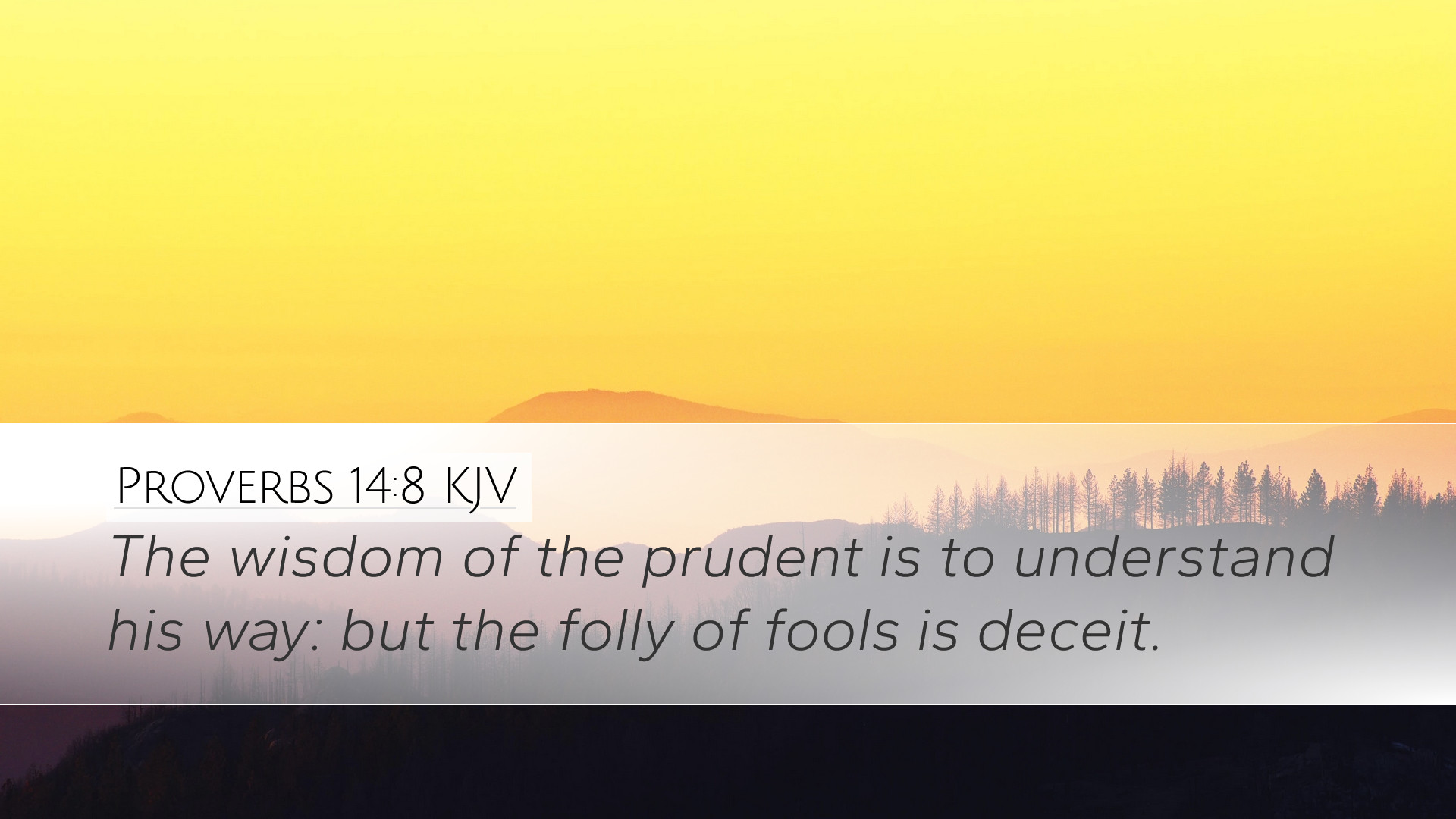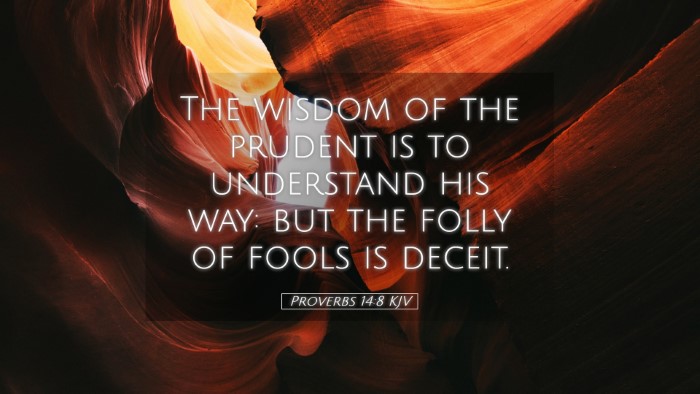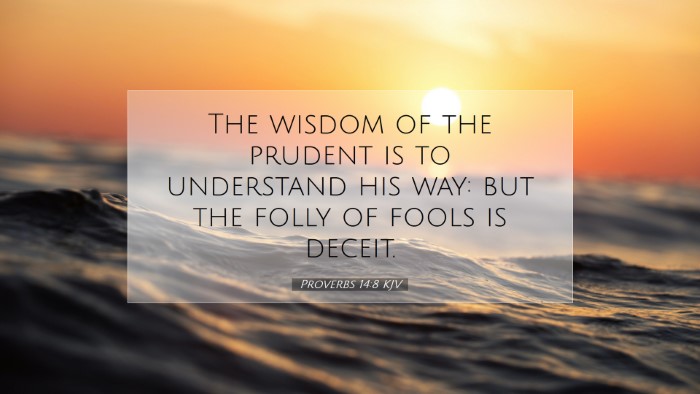Commentary on Proverbs 14:8
Proverbs 14:8 states, "The wisdom of the prudent is to discern his way, but the folly of fools is deceiving." This verse encapsulates a key theme of the Book of Proverbs, emphasizing the contrast between wisdom and folly, and demonstrating the significance of discernment in the life of a believer.
Introduction to the Verse
This proverb serves as a reflection on the nature of wisdom and folly. It highlights the fundamental difference between the prudent and the foolish, emphasizing that wisdom entails discernment and awareness of one’s path in life. The verse invites both contemplation and action, urging readers to seek true wisdom that leads to understanding and righteousness.
Insights from Public Domain Commentaries
Matthew Henry's Commentary
Matthew Henry provides profound insights into the nature of wisdom and its practicality. He notes that the wisdom of the prudent enables individuals to discern their way, suggesting that wisdom is not merely theoretical but is applied in decision-making and navigating life’s complexities. Prudent individuals actively evaluate their circumstances, weighing their choices against godly principles.
Conversely, Henry highlights the folly of fools, which he describes as deceiving. This deception manifests in various forms, including self-deception, leading individuals away from the truth. Fools are characterized by their inability to recognize the magnitude of their errors, which ultimately results in poor decisions and their negative consequences.
Albert Barnes' Notes
Albert Barnes elaborates on the concept of discernment presented in this verse. He emphasizes that true wisdom is proactive; it enables a person to foresee potential pitfalls and navigate through life’s challenges effectively. Barnes states that the wise person assesses their path with keen insight, understanding the ramifications of their actions.
Moreover, Barnes draws attention to the consequences of foolishness. He argues that the deception inherent in folly leads individuals to make choices that are not only misguided but often harmful to themselves and others. The fool operates without a moral compass or prudence, which, according to Barnes, has dire results, both in life and after death.
Adam Clarke's Commentary
Adam Clarke provides a detailed examination of the terms wisdom and folly. He relates wisdom to the fear of the Lord, asserting that true wisdom arises from a relationship with God. Clarke posits that the wise person acknowledges divine guidance, leading to sound judgment and clear discernment of their path. This relationship helps them to maintain a clear moral direction throughout life’s journey.
Clarke also notes that the term fools refers not only to those who lack knowledge but also to those who actively resist wisdom. This active resistance leads to a self-imposed blindness that leaves them vulnerable to deception. Clarke’s insights serve to remind us of the importance of aligning ourselves with godly wisdom to avoid the pitfalls of folly.
Theological Implications
The theological significance of Proverbs 14:8 rests on the understanding of wisdom as deeply rooted in the fear of the Lord. Proverbs insists that sincere spiritual insight leads to good judgment, which is essential for righteous living. This passage urges believers to pursue wisdom actively—seeking to align their choices with God’s intent and truth, thereby discerning their path with clarity.
This verse also challenges the notion of worldly wisdom, which is often rooted in self-reliance and temporal understanding. The contrast is stark, as the wise person acknowledges their dependence on God for guidance, while the fool relies on their understanding, often leading them to ruin.
Practical Applications
-
Self-Reflection: Believers are encouraged to evaluate their own lives and seek God’s wisdom in all decisions. This verse prompts a serious examination of whether one's path aligns with divine counsel.
-
Gathering Wisdom: Churches and ministries should emphasize the importance of biblical wisdom in decision-making, encouraging congregants to engage in prayer, study, and fellowship to grow in understanding.
-
Discerning Relationships: When forming relationships and making partnerships, prudence involves recognizing the difference between wise and foolish influences. This calls for discernment and careful consideration of those we associate with.
-
Teaching and Mentoring: Those in leadership or teaching roles have a responsibility to impart the lessons of wisdom found in scripture to the next generation. This involves contextualizing biblical lessons in a manner that individuals of all ages can relate to and learn from.
Conclusion
Proverbs 14:8 serves as a powerful reminder of the value of wisdom in the life of believers. It contrasts the astute discernment of the prudent with the perilous self-deception of the foolish. By drawing upon insights from esteemed commentaries by Matthew Henry, Albert Barnes, and Adam Clarke, we see the multifaceted nature of wisdom and its importance for practical living. As results show how wisdom leads to discerning one's way, we are encouraged to cultivate this precious quality, ultimately glorifying God through our choices.


